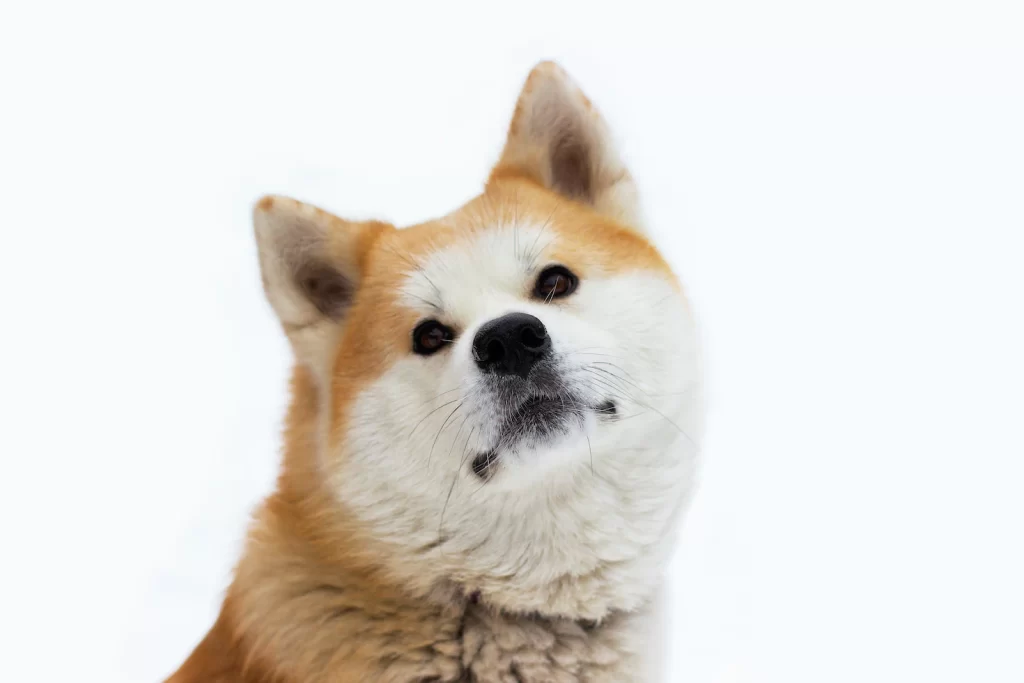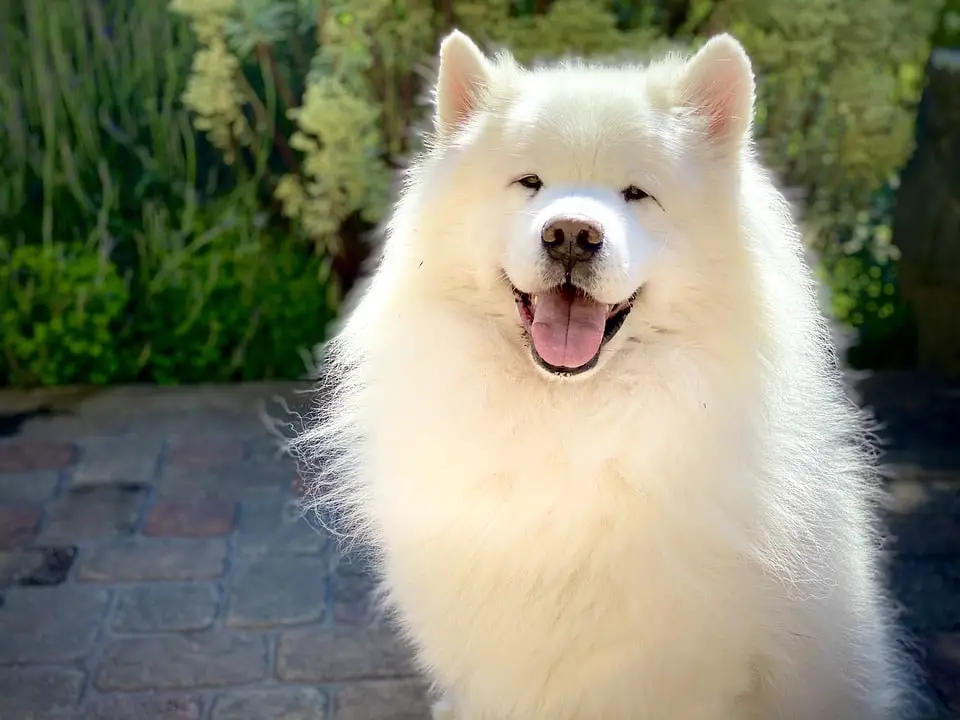

As Spitz dogs, Samoyeds and Akitas share many similarities. At the same time, the personalities of a typical Akita Inu and a typical Samoyed can be distinctly different.
Akitas and Samoyeds share the trait of being independent and wolf-like dogs. They are more challenging to train than many other breeds. Samoyeds, however, are known to be friendly, and behavioral issues are less common than in Akitas. Both breeds need plenty of exercise and early socialization. Both breeds make great activity companions and are better suited for experienced dog owners.
The Spitz Dogs Family
Spitz are considered to be the most primitive, or wolf-like, dogs. The Spitz family includes Shiba Inu, Icelandic sheepdogs, Alaskan Malamute, Pomeranians, Akitas, and Samoyeds.
Spitz dogs are hardy and fluffy northern creatures. Most have a working, herding, or hunting background, so they are diligent and dynamic animals. They need to stay busy.
Being wolf-like means they have strong instincts and are more independent than their counterparts from other canine families. Even Samoyeds with their strong bond with the owner and high intelligence are rather stubborn when you try to train them.
Most breeds of the Spitz family do exceptionally well in cold climates but struggle with hot weather, due to their northern background.
The Basics
| Trait | Samoyed | Akita Inu |
| Size | Up to 22 inches (56 cm) | Up to 26 inches (66 cm) |
| Weight | 35 – 66 pounds (16 – 30kg) | 55 -75 pounds (25 – 34 kg) |
| Life span | 12 – 14 years | 10 -12 years |
| Response to training | Above average | Below average |
| Personality/ temperament | Friendly, energetic, intelligent, stubborn | Independent, stubborn, loyal |
| Hypoallergenic? | No, but they trigger fewer allergies and trigger milder reaction reactions, in general. Every person’s reaction is different, however. | No |
| Exercise needs | High | High |
COMPARISON OF IMPORTANT BREED CHARACTERISTICS
Intelligence And Response to Training
Working intelligence refers to the dog’s ability to acquire new commands and skills.
Although both Samoyed and Akita Inu dogs are primitive dogs with strong instincts, Samoyeds are usually much easier to train, largely due to their friendly personalities, higher working intelligence, and exceptional problem-solving skills.
– Akita Inu Has Fair Working Intelligence
Akitas are not easy to train.
According to canine psychologist Stanley Coren, Akita scores lower than about 75% of other breeds for their working intelligence/obedience potential. That result puts Akitas at the top of the category of dogs with fair working intelligence or the bottom of the average group.
- Akitas can master simple commands with about twenty-five repetitions.
- Complex commands could take some time for them to respond to but they are expected to improve with practice.
- Akitas can forget skills and commands over time, and regular repetition and practice are important for retention.
- The dog might respond more reliably at home, in a familiar environment, but be more distractible outside and take longer to respond.
– Samoyeds’ Working Intelligence Is Above Average
As for Samoyeds, they are gifted when it comes to problem-solving skills. Samoyeds are above average in their working intelligence and training capacity:
- Samoyeds can be exceptionally stubborn and some dogs of this breed benefit from working with a professional trainer rather than an amateur.
- They learn commands and skills quickly but benefit from repetition and practicing in different settings.
- Samoyeds can get distracted outside, when the owner is at a distance, and not respond to commands as consistently as at home.
The Samoyed’s strong instincts are a caveat in training these dogs. You can train the dog to avoid chasing cats, for example, but many dogs’ strong hunting instinct kicks in and they could still chase a smaller animal even after extensive training.
Personality And Temperament
– Samoyed
Samoyeds are known for being friendly and non-aggressive. They bark and chase squirrels in parks but usually, that is the extent of their behavioral transgressions.
Samoyeds are eager to befriend strangers – other dogs and people alike. They also get along well with other household pets.
Despite their amiable disposition, Samoyeds are dogs with a hunting background, so they are energetic and hard-working animals.
– Akita
Akita Inu dogs are more unpredictable and more likely to require professional training, compared to Samoyeds.
Akitas are strong, territorial, and challenging to train. These dogs are gentle and devoted to their human family but are more likely to have behavioral challenges than many other breeds. Given their strength, it is important to train and supervise Akitas to avoid incidents.
Of course, there are individual differences among dogs within breeds of the same breed. Proper early socialization, consistent training, and supervision produce good results with most dogs.
Both Samoyed And Akita Have a Strong Prey Drive
Samoyeds and Akitas are working and hunting dogs by background, so both breeds have a strong prey drive.
Dogs of both breeds should receive appropriate training to teach them to leave small animals alone, especially outside. Akitas, however, are particularly prone to problems associated with their instinctive prey drive.
Samoyeds have a friendly disposition. They might chase cats and squirrels but they rarely harm smaller pets at home and other animals outside. Akitas, unless trained appropriately, require close supervision around small animals they encounter outdoors.
Akitas can have behavioral problems around other household pets, other dogs, and wild animals outdoors. They usually do quite well with household pets they grew up with but can be unpredictable and reactive.
The Dogs And Other Pets
Your Akita could view cats, squirrels, and even small dogs as prey. Their hunting instinct is strong, so this trait could be hard to unlearn.
If you have a grown-up Akita at home, introducing a cat or another smaller animal to your household could be a challenge. Akitas can be territorial and somewhat aggressive with other dogs, especially a new dog in their space.
If your Akita is raised with a cat or another dog from a young age, the animals might be able to live side by side peacefully.
Bringing another dog into your home could be difficult, too. Even a well-trained Akita could still feel too defensive to accept a new furry friend.
The Dog And Children
Even though they can be stubborn and not easy to train, Samoyeds are excellent dogs for families with children. Due to their patience, friendly attitude, and energetic and enthusiastic nature, Samoyeds are awesome family pets, although they are high-maintenance.
Akitas are more complex family pets due to some of their personalities and behavioral peculiarities.
If your Akita is raised in your family from puppyhood, the dog will probably become a cuddly, loving family pet, gentle with the children in the household. That said, Akitas are reactive dogs and need some supervision around children. Kids do not always respect a pet’s space and do not read the pet’s cues when they are still young, so the dog needs to be reserved and not respond aggressively to rowdy behavior.
The recommendation to supervise the interactions between kids and dogs is not specific to Akitas. Akitas, however, are challenging to train, and their habits are hard to change because they are instinctive.
Akitas can be great pets for older school-age children because these dogs are good hiking buddies and do well with outdoor activities. Akitas are not ideal pets for young kids due to these dogs’ reactivity, independence, and potential challenges with training.
Shedding And Maintenance
Akitas and Samoyeds shed a great deal throughout the year. They shed heavily seasonally twice a year.
Samoyeds are fluffier, so they tend to produce more shedding and also need more care for their fur.
Neither breed needs to be bathed unless the dog is dirty, nor do they need haircuts. Dogs of both breeds need to be brushed regularly to maintain the quality of the fur. Samoyeds, in particular, are prone to matting, so they need to be brushed a few times a week.
Akitas also benefit from at least weekly brushing but many dogs enjoy being brushed more frequently.
To Conclude
Samoyeds and Akita Inu are complex animals and are best for dog owners with some experience with dogs.
Samoyeds are generally more sociable and amiable dogs, welcoming other pets, and children, in their households. Akitas needs a very supportive upbringing with a lot of targeted training to achieve harmony in a household with other pets in kids.
Both breeds are great activity partners for active individuals, so they do beautifully with people who enjoy hiking, running, and participating in outdoor games.
Recent Posts
Akitas as a breed have a somewhat complicated reputation. You might wonder if Akita is aggressive toward other dogs. Akitas could be aggressive with other dogs because they are reactive and...
Sammy dogs are charismatic and friendly, and they are popular pets in general. However, are Samoyeds good pets for families with children? Samoyeds are amazing dogs for kids of school age and can...

